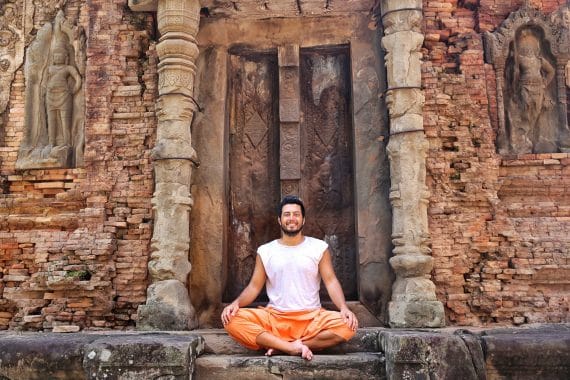The war at Bhgavad Gita, contain a very deep another war in itself. Beyond all those perceived physically, another war that takes place in the mind field. Knowing this war was forthcoming, before the war had strarted, his Guru told Arjuna; “When the time comes, you have to be ready to fight me.” In other words, when the time comes, he has to be ready to let go of what he had taught him. He has to throw away the rightness or wrongness of what you had learned so far and reach out for the truth. And in this story told in Bhagavad Gita, Arjuna goes to a big battle against his relatives and his Guru, a battle which he didn’t want to go to. And Arjuna says;
“I see adverse omens, O Keshava. Nor do I foresee any advantage from slaying kinsmen in the battle. O Krishna, I do not desire the victory, kingdom, or the happiness accruing it. Of what avail will be a kingdom, pleasures, or even life itself, when the very persons for whom we covet them, are standing before us for battle? Teachers, fathers, sons, grandfathers, maternal uncles, grandsons, fathers-in-law, grand-nephews, brothers-in-law, and other kinsmen are present here, staking their lives and riches. O Madhusudan, I do not wish to slay them, even if they attack me. Even if we kill the sons of Dhritarashtra, what satisfaction will we derive from the dominion over the three worlds, what to speak of this Earth?”
Deep down under these sentences is told this: In this world, as soon as the person knows himself, his family and the society expects him to be someone; a manager, doctor, engineer, educated, successful, hardworking, married, a job holder, strong, beautiful etc. And these expectations makes the person go into the effort of “being someone”. Furthermore, most of the time without even knowing if he wants to be that “someone”, simply being forced to be that person. Are you going to let your true self to die by being the person that your family, society, your teachers expect you to be? Or can you be yourself by standing against all these? Can you be “True-self” despite all the expectations from you?
Here, Arjuna questions why he has to go to a battle with them just to be hisself. Most of the people who is making an effort to find their true selves, who is on a journey to know and realize theirselves, also goes through this questioning. They mention that the journey to the real self shouldn’t be through a battle. But even while mentioning and questioning this, the person is talking from within a big battle. He expresses that his life is a battlefield as it is, holding many wreckages in many fronts. Like there isn’t any battle his whether the battle is necessary or not. And he says the need to be the victorious one awaken conditions just like the other desires in his life. Accept or not, the battle is going on every moment. At any moment of your life, even without fighting with anyone else to be someone, the person is fighting with himself. He fights with the one that is not his true self to find his true self. Just like the other cells fighting with the viruses getting inside the body in the physical world. The viruses are tried to be eliminated because they don’t belong to the body. And if the body is left to them, its unity can be destroyed, it can die. So, when the person is surrounded by the things that is not himself, the self starts to fight. To protect its unity from getting detroyed by the modifications of the mind. Otherwise, the person can burry the “True-self” inside, deep down. Arjuna is already in the battle like everyone else. Arjuna’s battle of “Being someone” has started when he was born, just like everyone else. Arjuna expresses that he thinks not fighting also wouldn’t make him at peace, with these sentences:
“We do not even know which result of this war is preferable for us—conquering them or being conquered by them. Even after killing them we will not desire to live. Yet they have taken the side of Dhritarasthra, and now stand before us on the battlefield.”
Here, he says he doesn’t know whether being in existence against them or being the person they want him to be is better. Because is it really living when you live a life that doesn’t belong to you? But in case as you don’t become the person they expect you to be, and if your family, society will turn their backs on you, does your life will have a meaning or not? In other words, is their happiness, and them being pleased with you, what gives meaning to your life?
“I am confused about my duty, and am besieged with anxiety and faintheartedness. I am your disciple, and am surrendered to you. Please instruct me for certain what is best for me. ” says Arjuna.
That, who takes shelter in the truth, and who wants to see the path from God, will get an answer in one form or another. Krishna returns to Arjuna with many striking sentences;
“Of the transient there is no endurance, and of the eternal there is no cessation. This has verily been observed by the seers of the truth, after studying the nature of both.
That which pervades the entire body, know it to be indestructible. No one can cause the destruction of the imperishable soul.
Only the material body is perishable; the embodied soul within is indestructible, immeasurable, and eternal. Therefore, fight, O descendent of Bharat.
Neither of them is in knowledge—the one who thinks the soul can slay and the one who thinks the soul can be slain. For truly, the soul neither kills nor can it be killed.
The soul is neither born, nor does it ever die; nor having once existed, does it ever cease to be. The soul is without birth, eternal, immortal, and ageless. It is not destroyed when the body is destroyed.
O Parth, how can one who knows the soul to be imperishable, eternal, unborn, and immutable kill anyone or cause anyone to kill?
As a person sheds worn-out garments and wears new ones, likewise, at the time of death, the soul casts off its worn-out body and enters a new one. ”
Krishna reminds Arjuna of that he has forgot what he was fighting for in this world, and that he got lost in finite troubles. Concepts like relatives, spouse, friends, victory are all finite. They will all end one day, and when the day comes there will be neither what you call now “I” left nor what you call spouse, friend etc. What is finite is indeed not real, they are the finite reflections of the infinite, they have infinite features coming from they being actually non existent. Krishna tells Arjuna that everything he has learned so far is what is limiting and restraining him, and just like leaving the old clothes, the old knowledge should be replaced with new knowledge, and the old self should be replaced with new self. That all the finite things should be left to become to reach the infinite until only the True self remains…This battle is actually about all the learned things, all modifications, all limitations, about everything that is not himself, says Krishna in his words. And reminds Arjuna that all this journey is in fact to the Infinite One. In other words, he reminds Arjuna of truth by making him question for what and with who he is fighting. By emphasizing on the impermanence of everything existing through this journey, he makes Arjuna realize that he is dwelled on the finite things and continues with these sentences that will shed light on his path:
“Fight for the sake of duty, treating alike happiness and distress, loss and gain, victory and defeat. Fulfilling your responsibility in this way, you will never incur sin.
Fight for the sake of duty, treating alike happiness and distress, loss and gain, victory and defeat. Fulfilling your responsibility in this way, you will never incur sin.
Fight for the sake of duty, treating alike happiness and distress, loss and gain, victory and defeat. Fulfilling your responsibility in this way, you will never incur sin.
Fight for the sake of duty, treating alike happiness and distress, loss and gain, victory and defeat. Fulfilling your responsibility in this way, you will never incur sin.
Those with limited understanding, get attracted to the flowery words of the Vedas, which advocate ostentatious rituals for elevation to the celestial abodes, and presume no higher principle is described in them. They glorify only those portions of the Vedas that please their senses, and perform pompous ritualistic ceremonies for attaining high birth, opulence, sensual enjoyment, and elevation to the heavenly planets.
With their minds deeply attached to worldly pleasures and their intellects bewildered by such things, they are unable to possess the resolute determination for success on the path to God.
Be steadfast in the performance of your duty, O Arjun, abandoning attachment to success and failure. Such equanimity is called Yoga.
One whose mind remains undisturbed amidst misery, who does not crave for pleasure, and who is free from attachment, fear, and anger, is called a sage of steady wisdom.
One who is able to withdraw the senses from their objects, just as a tortoise withdraws its limbs into its shell, is established in divine wisdom
Aspirants may restrain the senses from their objects of enjoyment, but the taste for the sense objects remains. However, even this taste ceases for those who realizes the Supreme.
While contemplating on the objects of the senses, one develops attachment to them. Attachment leads to desire, and from desire arises anger.
Anger leads to clouding of judgment, which results in bewilderment of the memory. When the memory is bewildered, the intellect gets destroyed; and when the intellect is destroyed, one is ruined.
But an undisciplined person, who has not controlled the mind and senses, can neither have a resolute intellect nor steady contemplation on God. For one who never unites the mind with God there is no peace; and how can one who lacks peace be happy?
O Parth, such is the state of an enlightened soul that having attained it, one is never again deluded. Being established in this consciousness even at the hour of death, one is liberated from the cycle of life and death and reaches the Supreme Abode of God. ”
P.s: Passages from Bhagavad Gita Chapter 1&2.

